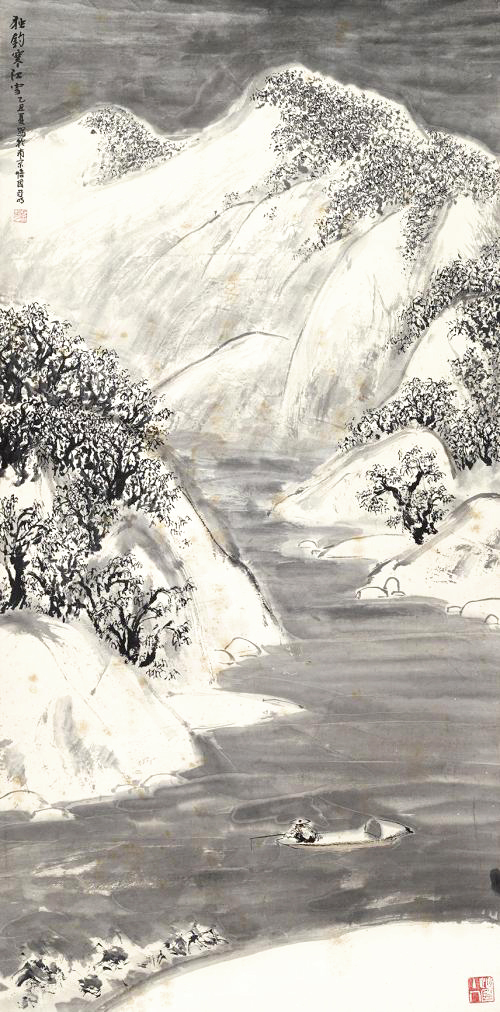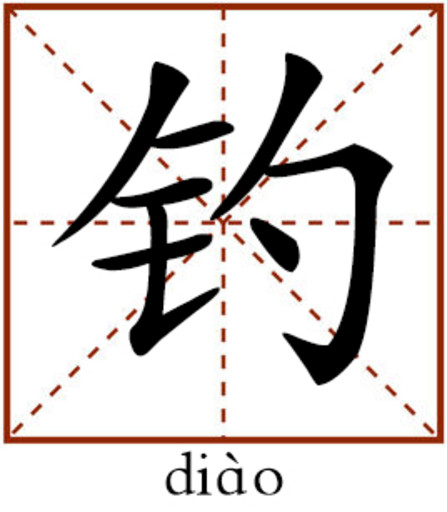Fishing expresses aspiration, spiritual freedom in ancient China

A lonely fisherman afloat and angling in the snowy weather demonstrates the harmony between humanity and the nature in Chinese culture.

Fishing provided a means for ancient Chinese scholars to pursue harmony between humanity and nature. It also provided a theme for them to communicate their feelings in literature.
Ancient Chinese scholar-officials have cherished fishing as a pastime since the dawn of recorded history. Whether they served in the imperial court or lived a free life among the mountains and forests, Chinese scholars would often take time, sitting by a quiet lake or a stream with a fishing rod, and enjoy the fun of fishing.
Fishing brought fun to literati and sparked inspiration in literary creation. As a way to express their aspirations and feelings, angling provided a means for ancient Chinese to pursue harmony between humanity and the nature. Chinese scholars developed a strong affection for angling and used it as a metaphor for various feelings within literary works, elevating fishing to a cultural pursuit.
Aspiration
Influenced by Confucian doctrines taught to them when young, Chinese scholars often considered “cultivating oneself, managing the family, governing the nation and spreading peace across the world” as their life-long mission. After studying hard for years to pass the national exams for selecting imperial officials, Chinese scholars competed for a chance to explore their potential and benefit society. Fishing was a way to demonstrate this aspiration. Patiently waiting for the fish to bite the bait symbolized the hard work needed to compete for these opportunities.
Jiang Shang (c.1156-c.1017 BCE) was the first known famous figure in fishing culture. The fishing story of Jiang Shang was recorded in the Records of the Grand Historian and later developed into a historical romance. The story generally goes that using no bait, Jiang fished with a straight hook one meter above the water by the Wei River. He said to himself “Those who are destined for me please bite the hook.” Eventually, Emperor Wen, the founder of Zhou Dynasty encountered him when he was fishing. Jiang helped the Zhou tribe overthrow the Shang Dynasty. Silently fishing then became a symbol of waiting for a chance to realize one’s aspirations.
Taoist philosopher Chuang Tzu also told a tale about fishing. He wrote, “A young nobleman from the state of Ren made an enormous fishhook on a black line and prepared fifty oxen as the bait. He squatted on Kuaiji Mountain and threw the hook into the East Sea. He did not catch anything for a whole year. At last a huge fish swallowed the hook and dived down with the enormous hook. It then rose up and shook its dorsal fin. The waves rolled as high as a mountain and the waters trembled all the while. The roar sounded like that of the gods and the devils and spread terror as far as a thousand li (500 kilometers).” Chuang Tzu used the huge fish as a metaphor of great aspirations or ideals. He used this tale to satirize those who were shortsighted in setting a life goal.
Meng Haoran, a famous poet in the Tang Dynasty wrote two well-known verses: “Sitting by and watching those fishermen, I have nothing but envy at the fish (they caught).” The fishermen symbolized the rulers and governors of the nation. Envying their fish was a metaphor about his being eager to serve in the imperial court and benefit the nation.
Spiritual freedom
Most scholars would try to maintain their noble and unsullied integrity and adhere to the Confucian requirements about a virtuous person. When serving in a position in the imperial court, a virtuous person dared point out the problems of the policies. They should not be corrupted by power and, nor let themselves be tainted by the bad environment. Usually, this honest attitude would cause them to be libeled, framed or isolated by other officials. Sometimes the ruler was blinded and also isolated himself from those principled scholars. These kinds of experiences saddened and angered some scholars.
Under such circumstances, fishing became the best way for those scholar-officials to relieve their sorrow and depression. Solitarily and silently fishing by a river, the scholars isolated themselves from their worldly reputation and interests, maintaining their free and independent personality. By doing this, they were able to rise unsullied from the mud and maintain their spiritual freedom.
Qu Yuan (c.340-278 BCE) served as a minister in Chu Kingdom. Throughout all his life, he maintained his noble integrity and, in face of the pressure from the aristocrats, he made no concessions in matters of principle. He was defamed by the aristocrats and later exiled by the king. During his exile, he roamed and fished by the Miluo River. He expressed his wish to preserve integrity by saying “Even when the entire world is turbid, I will remain clean; even when the entire world is drunk, I will remain sober.”
Liu Zongyuan (773-819) was banished from the court to Yongzhou after his participation in the failed Yongzhen Reform. There he wrote one of the most famous poems about fishing, which included the line: “From hill to hill no bird in flight; from path to path no man in sight. A lonely fisherman afloat; fishing snow in a lonely boat.” This poem was a manifesto that Liu wrote to his political opponents and the world. The fisherman became integral part of heaven and the earth. The poem best describes an image of a free spiritual world beneath the solitary exterior.
Fishing is one of the best forms of leisure. One is able to have a breath of fresh air and enjoy the beautiful natural scenes. Cultivating one’s personality through a sport that requires swift transformation between being dynamic and static, one would be able to realize the harmony and unity between humanity and the nature.
Most Chinese scholars also had the desire to live a hermit life. In Chinese culture, there is a saying about hermit life: “The great hermits live a hermit life in the court; the medium hermits live a hermit life in the cities; the minor hermits live a hermit life in the wilds.” Getting close to nature and appreciating the beautiful natural scenery was an ideal choice for many scholar-officials to relieve the stresses of politics, indulging in their aspiration to lead a hermit life and pursue spiritual freedom. Putting on a straw rain cape and bamboo rain hat, one sits solitarily by the water, holding a fishing rod. This was a great relaxation to both his body and mind. The worldly annoyance is dissolved when enjoying the simplicity of fishing. Fishing, for some scholars, had nothing to do with themselves or the fish, the beautiful natural scenery was all that they cared about.
Taoist ideas profoundly influenced many Chinese scholars, such as pursuing a pure heart and fewer desires, governing by doing nothing that goes against nature and following the natural courses of things. These ideas became important elements of strengthening the morality, polishing one’s personality and elevating one’s life state.
When the political environment severely conflicted with moral principles, some scholars would choose to abandon their positions in the imperial court and pursue spiritual freedom. They would prefer to be an unknown fisherman floating on the rivers and lakes. They took the gentle breeze and bright moon as their companions and the elk, fish and shrimp as their friends. Fishing with a lonely fishing rod between the heaven and the earth, these scholars gained enormous spiritual freedom and joy.
Yan Guang (39 BCE-41AD) was the classmate of Emperor Guangwu, the first emperor of the Eastern Han Dynasty. After helping the emperor to seize the throne, Yan chose to live a hermit life on Fuchun Mountain in present-day Zhejiang Province. He enjoyed a simple life of fishing and tilling the fields. Fishing was a way for Yan Guang to avoid dependence on the rulers and pursue an independent and free life. He was admired by the Chinese people because he chose not to swallow the “hook of high position and great wealth.”
Zheng Wei and Lu Yi are both from Sichuan Tourism University.
(edited by CHEN ALONG)
